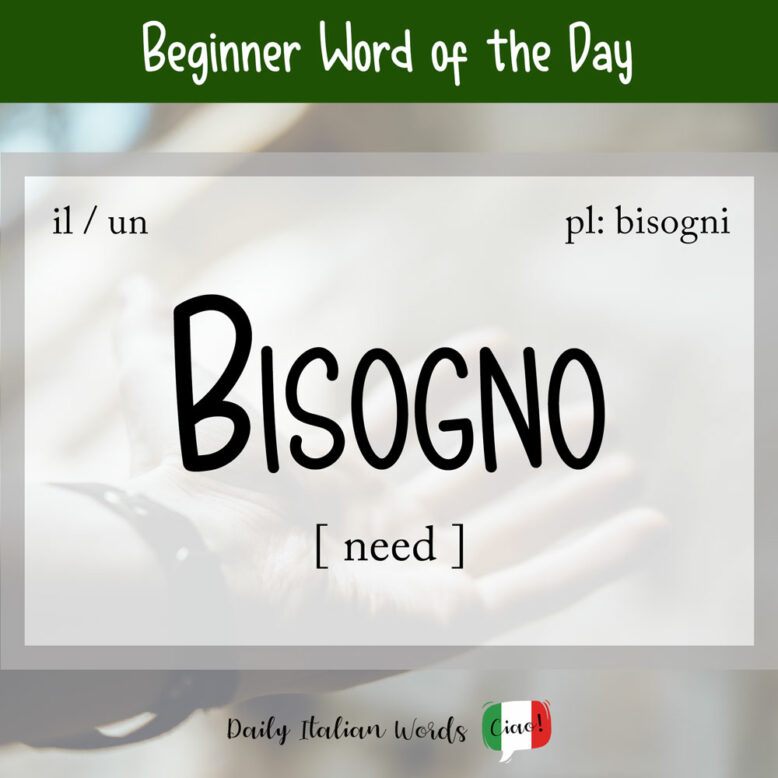One of the most useful words you’ll come across in the Italian language is bisogno (masculine, plural: bisogni).

On its own, it translates as need or desire but when combined with the verb avere (to have) and the preposition di (of ) or the conjunction che (that), it corresponds to the verb to need.
The first example sentence below shows how to use bisogno as a solitary noun whereas the second and third use the avere bisogno pattern.
Sento il bisogno di mangiare qualcosa.
I feel the need to eat something.
Ho bisogno di mangiare qualcosa.
I need to eat something.
Ho bisogno che tu mi porti qualcosa da mangiare.
I need you to bring me something to eat.

Below is the complete conjugation of the verb avere + bisogno in the present tense.
(Io) ho bisogno
(Tu) hai bisogno
(Lui) ha bisogno
(Lei) ha bisogno
(Noi) abbiamo bisogno
(Voi) avete bisogno
(Loro) hanno bisogno
I need
You need
He needs
She needs
We need
You (all) need
They need
Closely related to the word bisogno is the verb bisognare which means to be necessary / essential and in many cases, to need / have to / must. It is only used in the third person.
- Bisogna ripassare il testo tante volte. = It is necessary / essential to go over the text many times.
- Bisogna stare attenti a non contrarre il virus. = We must / need to / have to be careful not to catch the virus.
Yet another verb that translates as to need in Italian is necessitare, with the noun necessità being a synonym of bisogno. However it tends to be reserved for more formal or urgent situations and as a result, occurs more frequently in writing rather than in speech.
- Il ragazzo necessita di cure mediche. = The boy needs medical attention.
- Ho la necessità di parlare con l’avvocato. = I need to speak to the lawyer.
Another common expression is esserci bisogno di / che which may translate as to be a need for or to need depending on how you decide to interpret the phrase in English.
Non c’è bisogno di un permesso per entrare.
There’s no need for permission to enter.
(You don’t need permission to enter.)
Non c’è bisogno che i bambini si alzino presto.
There’s no need for the children to get up early.
(The children don’t need to get up early.)

Two other verbs you’ll frequently see used with bisogno are:
- sentire il bisogno di… = to feel the need to…
- soddisfare il bisogno di… = to satisfy the need to…
By extension, bisogno can mean poverty / in need (e.g. trovarsi nel bisogno = to be in need) and in its plural form, it is also a euphemism that adults use to talk about physiological needs (urination and defecation).
Il mio cane ha fatto i suoi bisogni sul tappeto.
My dog did its business on the carpet.
Heather Broster is a graduate with honours in linguistics from the University of Western Ontario. She is an aspiring polyglot, proficient in English and Italian, as well as Japanese, Welsh, and French to varying degrees of fluency. Originally from Toronto, Heather has resided in various countries, notably Italy for a period of six years. Her primary focus lies in the fields of language acquisition, education, and bilingual instruction.


